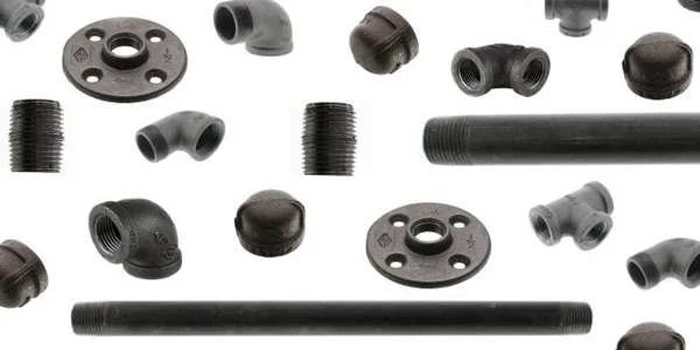When it comes to structural pipe fittings, two popular options are cast iron pipes and fittings and malleable iron pipe fittings. These fittings from pipe fittings manufacturers play a crucial role in creating strong and reliable connections in various plumbing, industrial, and construction applications. By understanding the characteristics and considerations of each material, project managers and plumbers can make informed decisions to ensure the success and longevity of their 90-degree structural connector applications.

Applications Of 90 Degree Structural Pipe Connector:
90 degree structural pipe connectors find applications in various industries and projects where strong and reliable connections are required:
- Plumbing Systems: In plumbing installations, 90-degree structural pipe connectors are used to create sharp turns in water supply lines or drainage systems.
- HVAC (Heating, Ventilation, and Air Conditioning) Systems: 90-degree structural pipe connectors are utilized in HVAC systems to connect ductwork and air handling units.
- Construction and Infrastructure: 90-degree structural pipe connectors are extensively used in construction projects and infrastructure development.
- Agricultural Irrigation Systems: In agricultural applications, 90-degree structural pipe connectors are employed in irrigation systems.
- Mechanical Engineering Projects: 90-degree structural pipe connectors are commonly used in mechanical engineering projects that involve the movement of fluids or gases.
Cast Iron Pipes and Fittings:
1.1 Strength and Durability: Cast iron is known for its exceptional strength and durability, making it a preferred choice for heavy-duty applications. Cast iron pipe fittings exhibit high tensile strength, allowing them to withstand significant loads and pressure.
1.2 Corrosion Resistance: Cast iron pipe fittings are resistant to corrosion, which is a crucial factor in plumbing and structural applications.
1.3 Noise and Vibration Dampening: Cast iron’s dense and sturdy nature provides excellent noise and vibration dampening properties. This characteristic is particularly beneficial for plumbing systems.
Malleable Iron Pipe Fittings:
2.1 Flexibility and Adaptability: Malleable iron pipe fittings are known for their flexibility and adaptability. Unlike cast iron fittings, malleable iron fittings can be easily modified, bent, or reshaped to suit specific project requirements.
2.2 Ease of Machining: Malleable iron is easier to machine compared to cast iron, which can be advantageous in certain applications.
2.3 Wide Range of Applications: Malleable iron pipe fittings find extensive use in various industries, including plumbing, construction, and industrial applications.
Comparing Cast Iron and Malleable Iron Pipe Fittings:
3.1 Strength and Load-Bearing Capacity: Cast iron pipe fittings excel in applications that demand high strength and load-bearing capacity.
3.2 Corrosion Resistance and Longevity: Both cast iron and malleable iron pipe fittings offer corrosion resistance, but cast iron tends to have better long-term durability.
3.3 Flexibility and Ease of Installation: Malleable iron fittings have an advantage in terms of flexibility and ease of installation. Their ability to be modified and their adaptability to different configurations make them a preferred choice for projects that require customization or quick adjustments.
3.4 Cost Considerations: Cost can be a factor when choosing between cast iron and malleable iron pipe fittings. Generally, malleable iron fittings tend to be more cost-effective compared to cast iron.
If you consider purchasing the quality pipe fittings from China, please contact JIANZHI as a pipe fitting wholesaler.
